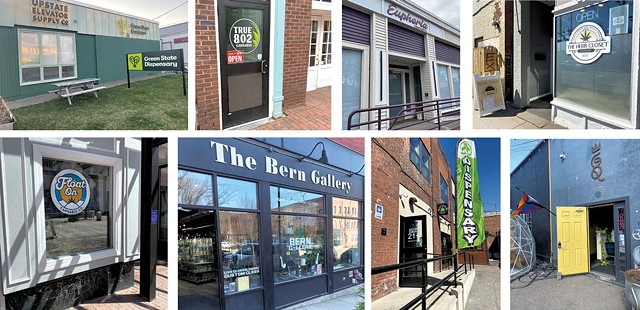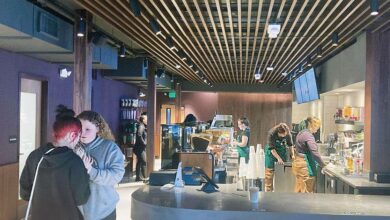Burlington’s Cannabis Marketplace Is Quickly Becoming Crowded | Business | Seven Days

During the unseasonably warm weather last week, strolling tourists in downtown Burlington tallied the cannabis stores that have sprouted like so many spring crocuses.
“Oh, look, another one!” Laila, a visitor from New Jersey, remarked to friends as she passed Float On Cannabis Co., a dispensary across the street from city hall. She held a bag containing weed from Green Leaf Central, a separate shop a few steps down an alley known as Thorsen Way. Five other cannabis stores beckoned within a short walk of the Church Street Marketplace.
Years after craft breweries turned Vermont’s biggest city into a destination for hopheads, cannabis is doing the same for potheads. Since legal sales began last October, 12 stores have opened in the Queen City, or will soon — most near a four-block stretch downtown.
While the owners have high hopes of success, it remains to be seen whether there’s enough of an appetite to sustain so many shops. A crowded cannabis marketplace and strict advertising regulations threaten to put a damper on the downtown Burlington green rush. Summer will be a big test for the stores, which hope to showcase their diverse selection of products, hospitable shopping environments and knowledgeable budtenders to the flocks of tourists who are expected to descend once the weather warms.
“There’s gonna be a buying frenzy, and it’s gonna be contagious, and we’re all gonna have a little action,” said Joe Verga, the 71-year-old owner of Green Leaf Central. “How long it lasts — I don’t know.”
Verga sounded unworried that so many new cannabis stores sit cheek by jowl. “I was a car dealer,” Verga said during an interview in the back of his store. “And you know what that’s like? You’re right next to each other.”
Selling weed, he reasoned, is no different: It’s all about the people you employ and the quality of the product you’re offering. “I’m just going to put my blinders on and stay focused on making a living,” he said.
Competition, though, is creating some tension. Tito Bern, owner of the Bern Gallery Cannabis shop on Main Street, has decided that he won’t buy products from growers or manufacturers who are working with a “multistate operator,” or a company that has a footprint in other legal cannabis markets. That includes Ceres Collaborative, a College Street shop that was the first to open in Burlington but is owned by Toronto-based SLANG Worldwide.
Well-funded companies such as that can drive prices down, then endure months, or even years, of losses, while independent, local businesses flame out, Bern said.
“And then they have a monopoly on their scene, and no one’s involved,” he said. “And that’s how you end up with these markets that you see in some other states.”
Ceres’ chief operating officer, Russ Todia, said Bern’s stance only hurts the small local business owners, not his corporation.
“We will never tell a manufacturer or grower who they can or can’t work with, because they’re trying to grow their business,” Todia said. “We’re about growing this cannabis industry in Vermont, and that means all of us — not picking who should be successful or putting our foot on the scale.”
The saturation of shops is a uniquely Burlington issue. The Vermont Cannabis Control Board, which regulates the market, has issued about 50 retail licenses statewide, but no other municipality is home to more than three. Some of the more populous municipalities, such as South Burlington and Williston, have none. That’s because residents of those two Chittenden County suburbs haven’t voted to “opt in” to the market, a necessary step before a store can open. Approximately 75 of Vermont’s 252 municipalities have opted in.
“That’s not good for access, and it’s going to keep people on the illicit market because it’s not convenient,” said Bridget Conry, a veteran of the medical cannabis industry who has applied to open a dispensary in Burlington.
She and business partner Shayne Lynn initially wanted to open in South Burlington. But the city council was unwilling to hold an opt-in vote, she recalled, so they settled for Burlington, where they both live. They’re transforming the former Lucky Next Door restaurant space on Cherry Street into High Fidelity, a cannabis shop for discerning consumers who might occasionally use weed “to help with something in their lives,” instead of partaking every day. She and Lynn are planning to diversify their offerings, selling coffee and other items people might have on their to-do list for the day.
“As a businessperson, you’re always nervous,” she said of the large number of dispensaries already open. “Retailers are going to need that diversification. If they’re all serving the same customers, that’s a lot of stores.”
Some Burlington city councilors have bemoaned the lack of local control over cannabis shops. As of now, there’s little they can do about the number or where they open — and there’s no apparent appetite to curb it. Councilor Ben Traverse (D-Ward 5), who serves on the body’s licensing committee, said he’s been happy with how businesses have acquitted themselves thus far and doesn’t think there are too many — yet.
“If we were to reach that point of saturation, where Church Street, the city has sort of been overwhelmed with businesses that are selling cannabis, then I think we may want to take a second look at our regulations,” he said.
James Pepper, the Cannabis Control Board chair, said it has no plans to regulate the number of stores in one city or town. But, Pepper said, the board is alerting those in the industry to the saturation so they can make sound business decisions and perhaps encourage “more equitable geographic distribution of retail.”
“We want some elements of capitalism, free market economics, to play out before the board really starts taking a heavy hand,” he said.
It’s unclear how quickly the market will shake out. In Massachusetts, which started legal retail cannabis sales in 2018, the first store to fail went out of business in December 2022. That was in Northampton, a college town of 30,000 people that had 12 stores open for a time.
Early signs are that Vermont sales have been solid, Pepper said. Through February, the state had collected $2.5 million in excise taxes on cannabis, which is subject to a 14 percent levy at the register.
“I think it’s a good early indicator that this is a strong market,” Pepper said.
The parallels between the Queen City’s brewery scene and its newly rooted cannabis one have not gone unnoticed by the Burlington Partnership for a Healthy Community, a substance-abuse prevention group. The organization wants the city to be mindful of where shops open, especially when considering children (state rules require a 500-foot buffer from schools, for instance), people who are in recovery and those struggling with addiction.
“The implications from a public health perspective are that there’s this normalization of substance use, and we find that that’s particularly impactful for youth,” said Mariah Flynn, the partnership’s coalition director. “How do you create an environment that makes it easier for people to make healthy choices?”
In interviews, several downtown Burlington store owners said sales are starting to pick up but have been slower than anticipated. Many said state restrictions on advertising limits their ability to reach customers. (The board must preapprove ads, and it has strict rules regarding ad wording, imagery and placement.) The store owners are relying on foot traffic, word of mouth, their websites, Google reviews and Leafly, a cannabis app that hosts menus and deals for participating stores. Only two shops, Green State Dispensary on Pine Street and the soon-to-open Euphoria Cannabis on North Avenue, have parking lots for customers.
“With bars and restaurants, there are plenty of those, too, so we can all definitely coexist,” said Josh Markle, co-owner of True 802 Cannabis. His light-filled store is up a flight of stairs on Church Street, above a bar he owns, Akes’ Place.
All stores must follow certain state-imposed rules, such as checking IDs at the door and at the cash register to ensure patrons are 21 or older, as well as offering pamphlets about cannabis from the control board. There are also regulations about outside signage and security measures. Otherwise, each Burlington store is embracing its own aesthetic.
Grass Queen, a tiny shop tucked off South Union Street, is queer- and woman-owned and sought to create an environment where “there are no stupid questions” and a customer can find what they’re looking for, retail director Kiersten Wall said. Inside looks like a trendy boutique, with a wall of merch and shelves filled with material from Phoenix Books, with whom the biz struck up a partnership. Purple velvet high-top stools sit next to the counter, which is made of a clear material with dried flowers suspended within. Popular products have included boxes of “dog walkers,” Wall said — shorter joints that someone can, theoretically, finish while out with their pooch.
“We really hope that we have an incredibly welcoming, unbiased and intentional space” that “feels different than the norm,” Wall said.
At Ceres on College Street, tablet-toting budtenders descend on customers inside the sleek shop, which sells a wide range of products, plus cannabis plants. Ceres had lines out the door when it was the only show in town. While those days are over, Todia, the COO, said a loyalty rewards program and other perks bring regulars back in.
“If anyone thinks that they can just keep customers and not work hard at it — by providing good service or good pricing or good variety — then I think there’s a real good chance that they’re going to struggle,” Todia said. “Because there will be a lot of options out there.”
To get to Bern Gallery Cannabis on Main Street, one must walk through a glass and smoke shop to the back, where a new wall shields the weed business from prying underage eyes. Inside, Paddy Donnelly, a brand ambassador and cannabis specialist, is eager to explain the differences between various terpenes (which give cannabis its smells and, some say, effects) and discuss the products he’s enjoying. The dispensary offers free journals so customers can, “in a stream of consciousness,” write down their experiences using a product so they know what works best for them, Donnelly said.
Beside the items for sale are write-ups about the small companies who make or grow them.
“I’m stoked that [customers] can actually pick something that they’re going to enjoy,” Donnelly said. “It’s the easiest job in the world to get enthusiastic about a cultivar that I’m freakin’ excited about.”
Like some stores, Bern Gallery offers discounts to veterans, people in the cannabis industry, those who work in health care and teachers — among others.
“Basically, if you’re helping society en masse, we are going to help get you stoned,” Donnelly said.
King McMillan opened the Herb Closet on Pearl Street in March, but he’s already seen how hard it is to keep the lights on. His was the first Black-owned store to open, and he benefited from certain fee waivers available through the state’s social equity program. But everything about running a cannabis business is more expensive than in other industries, he said, and owners can’t write off expenses because weed is federally illegal.
His storefront window is frosted, but inside the small shop, glass-top counters contain readily visible selections of cannabis and edibles; a rack of branded T-shirts lines one side of the shop. McMillan hopes his “inviting atmosphere,” good deals and late hours of operation — the doors are open until 11 p.m. on weekends — will keep him afloat.
But he knows it’s tough sledding and is realistic about the future.
“I think everybody has this idea of, I’m gonna open a dispensary, and I’m gonna make a million dollars this year!” McMillan said. “And then it’s just gonna be a bunch of businesses that fail.”

























































